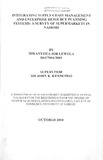| dc.description.abstract | This study was carried out among the supermarkets operating in Nairobi, Kenya, between
August 2003 and January 2004. The study was about the integration of SCM and ERP
systems. SCM as a competitive advantage creating and sustaining process aims at
optimizing a company's internal practices by synchronizing the management of the flow
of physical goods that results in efficient and economic product delivery. The major goal
of an SCM system is to optimize customer-supplier relationship. An ERP system on the
other hand is a packaged business software system, with several modules that can
facilitate the modeling of basic business processes, allow automation and integration of a
company's departments and link these to its customers and suppliers in a manner that
results in effective and efficient product! service delivery. SCM and ERP systems are not
exclusive but complimentary and there integration is expected to result in a multiplier
effect in terms of enhancing the organizations performance. However, this is not always
the case, as other researchers have demonstrated key limitations of current ERP systems
in providing effective SCM support.
The objectives of the study were to determine the awareness of supermarkets in Nairobi
on the usefulness of integrating SCM with ERP systems, to assess the level of
contribution as perceived by supermarkets as a result of integrating SCM and ERP
systems and to identify factors hindering full integration of SCM and ERP systems
among these supermarkets. The need for the study arose out of the necessity to establish
how systems improvements resulting from emerging best practices, among them
integration of SCM and ERP systems, can lead to gaining strategic value for the supply
chain within the Kenyan Retailing Industry.
The data collection for this study was carried out using a semi-structured questionnaire
and analyzed using descriptive statistics and frequencies. Factor analysis was used to
identify the factors hindering full integration of SCM and ERP systems among
supermarkets in Kenya. Results of the study revealed that, the respondents generally
associated integration of SCM and ERP systems with the creation of competitive
advantage for their organizations. Secondly, although the respondents indicated that
integrating the two systems is beneficial in enhancing marketing services, budgeting and
resource planning, distribution management, customer focusing and supplier contact,
only about one third had embarked on using either of the systems, let alone integrating
them. Thirdly, for those integrating, the factors hindering full integration of SCM and
ERP either related to organizational structure, staff issues, financial and technological
constraints, Finally, because of the hindrances to integration the respondents suggested
staff training and sensitization, organizations embracing new technologies and open
. sharing of information as some of the ways of enhancing integration of SCM and ERP
systems for the "benefit of their organizations.
In conclusion, majority of the supermarkets that took part in the study are moderately
aware of the use of SCM and ERP let alone the integration of SCM and ERP and that the
hindrances to integration stem from organizational, technological and environmental
factors. The study recommended that further study be done to determine the reasons
behind the individual hindrances. | en |

